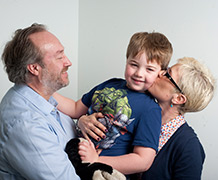Articles

The Puleston family
Family becomes first in South West to take part in ground-breaking DNA research
A six-year-old boy and his mum and dad today became the first family in the South West to take part in ground-breaking DNA research at the Royal Devon and Exeter NHS Foundation Trust (RD&E), with support from the University, to help fight rare health conditions.
Noah Puleston, from Honiton, has moderate to severe learning difficulties after showing signs of delayed development from an early age. The cause of his difficulties has so far remained a mystery but he and his family now have an opportunity to unlock the mystery and achieve a clearer diagnosis after the Royal Devon and Exeter NHS Foundation Trust was chosen to lead one of 11 new state-of-the-art genomics medicine centres across England.
Noah’s mother, Sam Puleston, said the family have long suspected that Noah’s condition is not classic autism, as his behaviours are not typical. She said: “This is a really exciting day, not only for us as a family to find out more about Noah and what our genetics might mean for ourselves and our other children. It’s also exciting for what this project could mean for other people, because of the potential to discover new treatments.”
Noah, Sam and his father Andrew gave samples of their DNA to a specialist team at Research, Innovation, Learning & Development (RILD) Centre at the RD&E. The South West Peninsula NHS Genomics Medicine Centre, based at RILD, brings together clinicians and scientists from the RD&E, the University of Exeter Medical School and the South West Peninsula Academic Health Science Network. It builds on the internationally renowned genetic diabetes research led by the University of Exeter Medical School researchers which has improved the lives of patients across the world.
The samples given by the family will give the team their ‘genomes’ – a complete set of the family’s genes. Noah, Sam and his father Andrew attended the NIHR Exeter Clinical Research Facility to donate samples of their DNA to a specialist team. By collecting and decoding this complete set, the team will be better able to identify any genetic differences between Noah and his mum and dad and pinpoint the cause of his learning difficulties for the first time. This may help clinicians and the family to tailor treatment and support for him now and in later life.
Professor Sian Ellard, programme director for the Genomic Medicine Centre, said: “This new type of genetic testing works by decoding the genome to help families find out why they have a particular health problem. Many parents wait years for a precise diagnosis or never know cause of their child’s disease. Genome sequencing provides an opportunity to provide answers and in some cases will lead to better treatment.”
The family’s decision to donate their genomes comes after the RD&E was selected to play a key role in the ground-breaking 100,000 Genomes Project. This involves collecting and sequencing 100,000 sets of people’s genes across England to enable to scientists and doctors to understand more about rare diseases and cancer. The project aims to establish England as a world leader in the fight against life-threatening and debilitating diseases.
Dr Charles Shaw-Smith, RD&E Consultant Clinical Geneticist, said: “This is a really exciting day for Noah and his parents, but also for the parents of all children with undiagnosed genetic disorders. These parents have to go through a lot of distress in bringing up a child with special needs, and they often experience a deep amount of frustration. They can go from doctor to doctor and have test upon test to try to find a diagnosis for their child, and often the answer is ‘we don’t know’. This project is about trying to find the answers for those children.”
Angela Pedder, RD&E Chief Executive, said: “Innovating our services to benefit our patients and their families is a key part of the RD&E’s vision and that is why we are delighted to be one of the first 11 Genomics Medicine Centres in England.
“We are very proud to welcome Noah and his parents to the centre and I sincerely hope that through this pioneering work we can make a difference to both them and other families affected by rare diseases and disorders.”
Professor Steve Thornton, Dean of the University of Exeter Medical School, said: “This is a momentous day in a project which puts the South West at the heart of genomics research. The 100,000 Genomes Project will provide researchers with a rich source of data and will help our scientists unlock answers on why disease occurs. This will lead to new treatments.”
Dr Rosie Benneyworth, Medical Director, South West Academic Health Science Network, said: “The 100,000 Genomes Project has the potential to transform the future of healthcare. It could improve the prediction and prevention of disease, enable new and more precise diagnostic tests and allow personalisation of drugs and other treatments to specific genetic variants.
“This project cannot succeed without people like Noah and his family and we hope his decision to give samples of his DNA will not only benefit him but future generations. We are delighted to be supporting the Genomics Medicine Centre in the South West with guidance and support on governance, IT, monitoring performance and communications.”
Date: 24 April 2015
